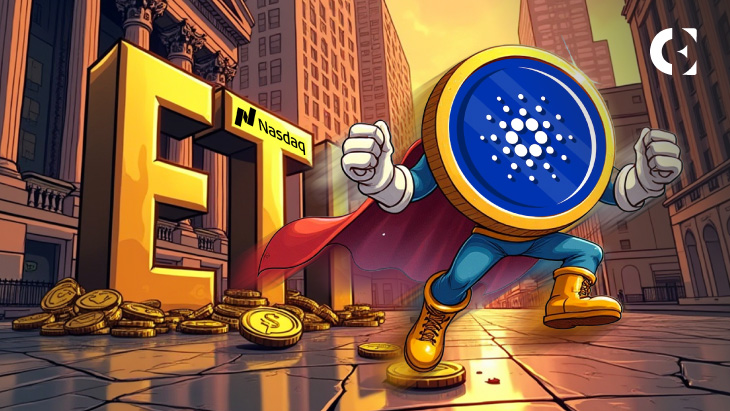- Cardano joins the Nasdaq Crypto Index, signaling rising institutional interest.
- The SEC has until Nov. 2 to decide on the ETF rule change to include ADA and others.
- ETF rollout is likely in early 2026, giving markets time to prepare for institutional demand.
Cardano’s inclusion in the Nasdaq Crypto U.S. Settlement Price Index marks a pivotal development for ADA’s institutional recognition. The addition occurred in June 2025, placing Cardano alongside established cryptocurrencies in a benchmark tracked by major financial institutions.
The Hashdex Nasdaq Crypto Index U.S. ETF currently operates under SEC restrictions that limit holdings to Bitcoin and Ethereum. Despite Cardano’s inclusion in the index, the token remains excluded from actual ETF portfolios until regulatory approval is received.
Nasdaq has submitted a proposed rule change to the SEC requesting permission to expand ETF holdings. The filing seeks authorization to include Cardano, XRP, Solana, and other cryptocurrencies that are currently listed in the index but are not included in fund allocations.
SEC Timeline Creates Investment Uncertainty
The SEC has until November 2, 2025, to respond to Nasdaq’s proposal. This decision will determine if institutional investors will have direct exposure to Cardano through regulated investment products.
Current market conditions limit retail and institutional access to ADA in conventional brokerage accounts. ETF approvals would eliminate these limits and may create new conduits for demand for Cardano tokens.
The expanded index now includes nine cryptocurrencies, up from the original five. Bitcoin, Ethereum, Litecoin, Chainlink, and Uniswap retain their spots, while Cardano, Solana, XRP, and Stellar have been newly added due to growing momentum.
Index weighting schemes can impact the market power of ADA when ETF participation is a reality. Greater weightings exert more buying pressure when funds rebalance to match benchmark weights.
Institutional trading behavior differs from retail behavior and can help reduce Cardano’s price volatility by utilizing long-term accumulation mechanisms. Systematic rebalancing and dollar-cost averaging are typically employed by professional money managers, rather than emotional buy-and-sell orders.
Cardano ETF Timeline Extends SEC Approval
The timeline for actual ETF implementation extends beyond SEC approval. Fund managers need operational preparation periods to integrate new assets, establish custody arrangements, and modify trading systems. A realistic target for expanded ETF holdings is early 2026, assuming SEC approval in November 2025. This extended timeline provides market participants with an opportunity to position themselves ahead of the anticipated wave of institutional demand.
Cardano’s development cycle can influence institutional sentiment throughout the approval phase. Network updates, partnership updates, and ecosystem growth metrics can be factored into investor valuation models. The outcome will determine ADA’s long-term price trend regardless of short-term market fluctuations. Institutional onboarding generates more regular demand patterns compared to speculative retail speculation.
Related: Cardano ETF Approval Odds Spike to 90%: Is ADA Set for a Breakout in 2025?
Disclaimer: The information presented in this article is for informational and educational purposes only. The article does not constitute financial advice or advice of any kind. Coin Edition is not responsible for any losses incurred as a result of the utilization of content, products, or services mentioned. Readers are advised to exercise caution before taking any action related to the company.







